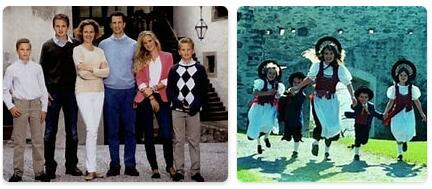Yearbook 2016
Liechtenstein. The current population of Liechtenstein is 38,139. According to thereligionfaqs, the British referendum on leaving the EU resulted in Liechtenstein becoming the subject of interest from Scotland, with a majority voting to remain in the EU. Visitors were looking for models for continued access to the Union’s internal market. The Principality was, along with Norway and Iceland, covered by the EEA Free Trade Agreement with the EU.

According to the 1990 census, the population of Liechtenstein was 28,877, including 10,218 foreigners (44% Swiss); the capital, Vaduz, had 4870 residents in the same year. In recent decades, the traditional economic structure of Liechtenstein based mainly on the agricultural-pastoral sector, has changed: today only 1.8% of the active population is employed in agriculture (which has cereals and potatoes as its main products) and in cattle breeding. Against this contraction in the primary sector, the secondary sector recorded considerable progress, which added chemical, pharmaceutical and precision (optics and electronics) plants to the traditional textile sector. However, the main source of income comes from the strong inflow of foreign capital, attracted by the political stability of the country and the powerful banking system. Furthermore, numerous foreign companies and financial companies (Swiss in particular) have their headquarters in Liechtenstein, recalled by favorable tax legislation.
History. – The return in 1974 of the Progressive Citizens’ Party, in the person of its leader W. Kieber, at the head of the new government – which, as happened since 1938 and has continued to occur until today, was formed by a coalition between the only two parties present in Parliament, the progressive one, in fact, and the Patriotic Union -, however, lasted only one term. In fact, in the political elections of February 1978, the position was reversed again in favor of the Patriotic Union (8 seats against 7 of the Progressive Party) whose leader H. Brunhart thus led the new coalition government. These results marked the beginning of a new phase in the balance of power between the two parties: in the subsequent political elections of February 1982, February 1986 and March 1989, the electoral supremacy of the Union was confirmed, albeit always to a limited extent. patriotic who has thus continued to hold the leadership of the coalition government always headed by H. Brunhart. This situation of substantial immobility of the political framework is reflected, on the other hand, by the scarce and more often than not only occasional differences in programs between the two parties (united by a similar conservative commitment), and by the quantitative irrelevance of other groupings (the last to appear in the political elections of 1986 and 1989, the Free List, of
In the context of the profound traditionalism that characterizes the life of the country not only on a strictly political level, the last decade has nevertheless witnessed some significant transformations on the level of civil rights. Social and mental changes at the level of public opinion have in fact translated into new, albeit limited, legislative measures.
First of all, as regards the problem of women’s emancipation. If in December 1985 a national referendum rejected the proposal for a constitutional amendment that guaranteed the principle of equality between the sexes, in July 1984 a previous referendum had instead approved (albeit with a minimum majority: 2370 votes in favor against 2251 against) the proposal to extend the right to vote to women (this referendum concerned voting in national political elections, while for municipal elections the Parliament had already approved a law on the matter in 1977, then updated with a further referendum in 1984 and another in 1986, which included in the reform the last municipalities still linked to the old electoral system).
The modification of the Criminal Code is inserted in a different sphere, but still of an innovative sign: advocated by the heir to the throne, Prince Hans Adam, in his 1984 program, pronounced when he was invested with executive powers by his father Francesco Giuseppe ii (later died in 1989), this reform, drafted and approved by Parliament in June 1987, abolished the death penalty, even if it maintained the ban on abortion.
Finally, as regards foreign policy, after having been admitted (1978) to the Council of Europe, in September 1990 he joined the UN and in 1991 he became a full member of the EFTA. (European Free Trade Association).